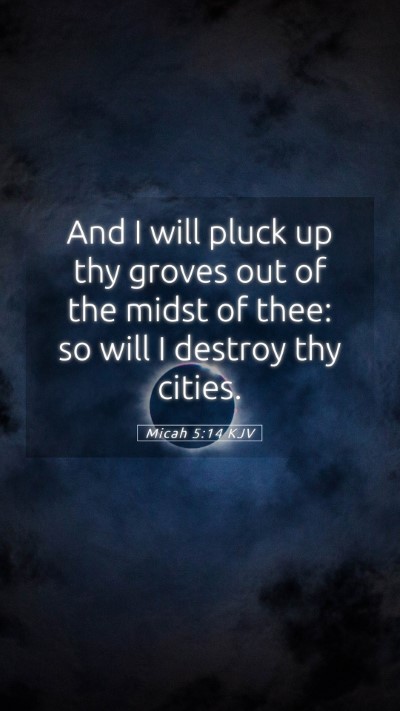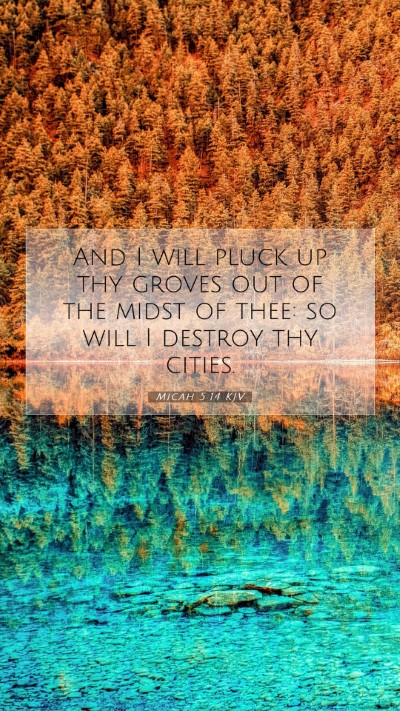Old Testament
Genesis Exodus Leviticus Numbers Deuteronomy Joshua Judges Ruth 1 Samuel 2 Samuel 1 Kings 2 Kings 1 Chronicles 2 Chronicles Ezra Nehemiah Esther Job Psalms Proverbs Ecclesiastes Song of Solomon Isaiah Jeremiah Lamentations Ezekiel Daniel Hosea Joel Amos Obadiah Jonah Micah Nahum Habakkuk Zephaniah Haggai Zechariah MalachiMicah 5:14 Meaning
What is the meaning of Micah 5:14?
And I will pluck up thy groves out of the midst of thee: so will I destroy thy cities.
Micah 5:14 Bible Verse Meaning
Micah 5:14 - Bible Verse Meaning and Commentary
Micah 5:14 states: "And I will pluck up thy groves out of the midst of thee: so will I destroy thy cities." This verse comes in a context where God is speaking through His prophet, Micah, addressing the people of Israel regarding their idolatrous practices and the impending judgment they shall face due to their sins.
Overview of Micah 5
In Micah 5, the prophet addresses the future hope that would come through a ruler born in Bethlehem. The chapter highlights themes of judgment, restoration, and the expectations of a faithful remnant. The latter part of the chapter focuses on the purification of Israel from idolatry, which is critical for understanding this specific verse.
Summary of Micah 5:14 - Biblical Exegesis
This verse specifically denotes the act of God "plucking up" the groves, which can be understood as a metaphor for removing false worship practices. The "groves" often refer to places of pagan worship, particularly linked to the worship of Asherah, a Canaanite goddess.
Commentary Insights
- Matthew Henry: He emphasizes that the removal of these groves represents God's desire to purify His people from idolatry, thus refining their worship practices and restoring them to a rightful relationship with Him.
- Albert Barnes: Barnes notes that the groves symbolize the temptation of the Israelites to blend pagan practices with their worship of Yahweh. God's act of destruction here signifies the severe measures He takes to protect the integrity of His covenant people.
- Adam Clarke: Clarke points out that this verse serves as a dire warning of the consequences of persistent sin. He explains that the destruction of cities mentioned here highlights the totality of judgment on the nation if they do not repent.
Significance of the Verse
Understanding Micah 5:14 involves recognizing the larger historical and spiritual context. This passage serves as a reflection on God's holiness and His intolerance for idolatry. It signals the importance of returning to a pure and undiluted worship experience, free from cultural and pagan influences.
Bible Study Insights and Applications
For those engaging in Bible study groups or using online Bible study tools, this verse presents fertile ground for discussion on the nature of idolatry in contemporary life. Applying its lessons can assist believers in assessing their own lives for hidden idols that may have crept in.
Practical Applications
- Assessing personal worship: Are there practices or attitudes in your faith that mirror the idolatry condemned in Scripture?
- Understanding judgment: Reflect on God's nature as both loving and just, calling His people to repentance.
- Encouraging community accountability: Engage with others in your Bible study group about the importance of maintaining pure worship.
Related Bible Cross References
- 2 Kings 23:14: Discusses the destruction of idols and groves in the reformation under King Josiah.
- Isaiah 10:10-11: Highlights God's sovereignty over nations and their fate when straying from His commandments.
- Jeremiah 44:15-19: Describes the people’s refusal to abandon pagan practices despite God's warnings.
Conclusion
Micah 5:14 serves not only as a historical account but also as a reminder of God's desire for His people to remain faithful. In this era of personal and communal worship, it beckons believers to consistently examine their practices against the truth of Scripture. Engaging deeply with this verse through Bible study insights can amplify understanding and lead to profound personal applications.


